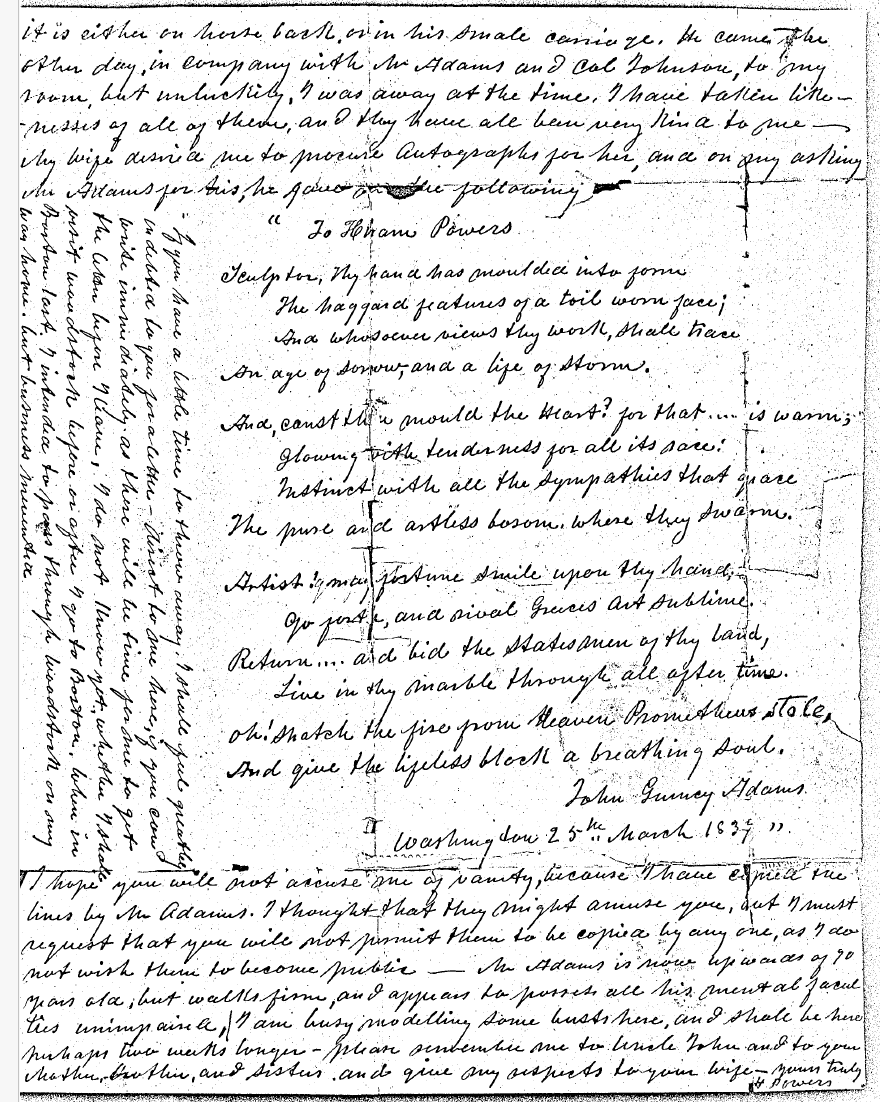Letter from Washington: Glimpses into Hiram Power's Woodstock
Hiram Powers as a young man. Francis Alexander completed this painting of Powers around the time that the following letter was written. Shortly thereafter, Powers left for Florence, Italy.
Below is the transcription of a copy of a letter that is in the Woodstock History Center’s archive. Some of the words that were difficult to discern have been left blank. These words are highlighted in the electronic facsimile of the letter at the bottom.
This letter is significant because it gives insights into the bond that Hiram Powers felt for Woodstock and his extended family. It also provides a glimpse into his relationship with former President John Quincy Adams.
Washington April 24th, 1837
Cousin John
The time was when if any one had said, that in after years, we should remain so long without communicating with each other, I could not have believed it. On any part – to be a day without seeing and having a chat or frolic with you was a grievious [sic] privation, and I used to look for you, and listen for your whistle, or the baying of your fathers [sic] dog, who accompanied you always, with as much anxiety and when I saw or heard you coming – pleasure – as was possible for me to feel.
Portrait of Dr. John D. Powers, “Cousin John’s” father and Hiram Power’s uncle.
When I think of John D. Powers I see through the lapse of some seventeen or eighteen years – a trim built active looking boy – somewhat smaller than I was – but of a swifter foot, and ____ wit. His whole expression was that of restlessness and importance of any con_____ or ____-direction. “Sufficient for the day is the coil theory(?)” was his maxim as divulged by his careless countenance and lively air – He could not conjure his mind to study. There were too many things to be seen and heard around him to admit of that – yet when he did make an effort, his progress was rapid, but this was seldom – His father, used to say – that John was a smart boy whenever he chose to be so – and he was, and the most crafty of any of my school fellows – I have no power to conjure up in my mind your present appearance. It seems impossible that John D. Powers can be a man bordering on 30 years in his age – But I shall see you, I hope, within a few weeks, and then I shall know what time has been doing with you.
There is one thing of which I am sure, and that is – if you show your tongue, I shall know you among a hundred for you and I have cause to remember a certain leap, which you once made from a hay mow by which your tongue was nearly bitten in two – the thing occurred , if I mistake not, in your Fathers barn at the area of the garden towards the Potash – I can fancy that I see now the scar which was left across your tongue –
I received letters lately from our Cousin, John P. Richardson. In which he tells me that an old acquaintance – “Rat Leet” is dead but he made no mention of his father. The old fisherman and gingerbread baker – I hope that he is not dead also, for he has a prominent position in my memory, with his fishing rod in one hand, and staff in the other, halting along the banks of Quechy – How I used to envy him his success in trout catching! I laughed once, with wicked delight on seeing a ________ carry under the rocks at the foot of Mowers dam – a string of fine trout. While Leet was watching for a bite. I could entertain no such feelings now towards the poor old fellow! – Cousin John, gave me a melancholy account of several of any old acquaintances there – of the Lockwoods and others. The good old Capt Wilder he says is still living, and I hope I shall see him, and once more hear him play old Joe Baker on his fiddle. But I find that I am writing from ____ than to Woodstock, and it is time that I begin to say some thing about things here.
There is little going on in Washington worthy of your notice just now. During the recess of Congress, Washington is rather a dull place. It has no commercial advantages, and the country around it is mostly waste land, and quite flat, and in the winter the wind perpetually howls over it and gives it the appearance of utter desolation. I say the wind does this, for it is generally from the northwest, and purges (?) the earth and streams deeply – There are thousands of acres around this city, without fences or any signs of cultivation – In the spring and summer, it is quite pleasant here, and as there is constantly a breeze, it would be preferable to many other cities to live in, where it not for the dust, which rises off the avenue, which is W. ____________. I have seen the dust drifted like snow, against the curbstones and gratings. The shop keepers _________ from this cause for sometimes a single gust will fill their stores with the finely pulverized stone to such a degree as to recquire the taking down of all their goods, to be cleansed by shaking in the open air –
The President does not appear in public now, so often as he used to do before his election. When he does come out, it is either on horse back or in his small carriage. He came the other day in company with Mr. Adams and Col Johnson to my room, but unluckily, I was away at the time. I have taken little misses of all of them, and they have all been very kind to me – My wife desired me to procure autographs for her, and on my asking Mr. Adams for this, he gave the following
“To Hiram Powers
Sculptor, Thy hand has moulded into form
The haggard features of a toil worn face;
And whosoever views thy work, shall trace
An age of sorrow, and a life of storm.
And, canst thy mould the Heart? For that … is warm
Glowing with tenderness for all its
Instinct with all the Sympathies that grace
The pure and artless bosom where they swarm.
Artist! May Fortune smile upon thy hand!
Go forth and rival Greece’s art sublime:
Return… and _____ the statesmen of thy land.
Live in thy marble through all after-time.
Oh! Snatch the fire from Heaven, Prometheus stole,
And give the lifeless black, a breathing soul.
John Quincy Adams
Washington 25th March 1837.
President John Quincy Adams by Hiram Powers. Modeled 1837, plaster, 22 3⁄4 x 14 3⁄4 x 10 3⁄8 in. (57.8 x 37.4 x 26.2 cm), Smithsonian American Art Museum, Museum purchase in memory of Ralph Cross Johnson, 1968.155.18
While John Quincy Adams was modeling for a bust of clay, Hiram and the former President chatted and struck up a friendship. Powers later stated of Adams, “I do not know that I have ever met with a more entertaining man.”
I hope you will not accuse me of vanity, because I have copied the lines by Mr. Adams. I thought that they might amuse you, but I must request that you will not permit them to be copied by any one, as I do not wish them to become public - Mr. Adams is now upwards of 70 years old, but walks firm, and appears to possess all his mental faculties unimpaired. I am busy modelling some busts here, and I shall be here perhaps two weeks longer – please remember me to Uncle John and to your mother, brother, and sisters, and give my respects to your wife.
Yours truly
H Powers
If you have a little time to throw away, I shall feel greatly indebted to you for a letter. Direct to me here, if you can write immediately as there will be time for me to get the letter before I leave. I do not know yet whether I shall visit Woodstock before or after I go to Boston, when in Boston last, I intended to pass through Woodstock on my way home, but business prevented.
Above portrait of John Quincy Adams as an elderly man.
Note: Hiram Powers was clearly very honored that Adams had written the poem about him and showed it to several people, and yet he asked that it not be published citing in a letter to General Edmund P. Gaines: “In the first place, it is a compliment to me and it is the highest kind of vanity in a man to publish or allow to be published anything in praise of himself. In the next place, it would be laid hold of by Mr. Adams’ political enemies and its meaning discussed, etc., and thus I should be mortified with their comments for months to come. Lastly, it would not perhaps be agreeable to Mr. Adams himself, to see it in print.”








